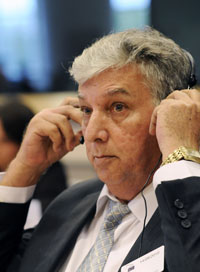Desperate realities call for hope. It is not just a game of words, because you don’t play with hunger and the future (my own and my family’s). It is about going deeper into another version of circumstances. And seeing the rainbow where others see a gloomy sun and a stubborn and relentless rain.
I am writing this declaration of optimism now that the Spanish government has withdrawn the financial aid that it had provided us, when in the summer of 2010, directly from the Cuban jails, we arrived as former prisoners of conscience along with others there just by coincidence, or not.
Now, when an economic crisis — not at all comparable to the Cuban catastrophe — takes control of our situation, and with no jobs, we have to overcome the tears and the emptiness of our wallets. At least for self-respect, I refuse to let my self-pity feed the jubilation of the tyranny that exploits Cuba.
• Related: Journalists
languish in Spain
I understand, as well as I am trying to make others to understand, that our circumstances are different from other unemployed people. Immigrants from other nationalities have the option to return to their home country; we do not. A Spaniard who has lost his job seeks and gets the support of a relative. But in our cases, our families are suffering from the very same situation without support.
One question fills us with uncertainty: The European Union has no budget for cases like these? It would be fair to mention that according to the document that former Cuban prisoners signed in Havana, the economic aid would be extended for up to 24 months in case of economic hardship. This period has not expired, not even for those of us who first arrived in Madrid.
No matter how hard the situation is today, we should not get discouraged. Just remembering a day in a Cuban prison is enough to stop us from complaining about our current difficulties, and to keep fighting to be victorious in the future. We do not need a miracle. We just need to not forget, we need to dream about a future and make it a reality.
When we arrived in Spain most of the people embraced us with the proverbial Spanish hospitality. At the time, as part of that group of former prisoners of conscience, I expressed our gratitude. However, many in the press omitted it. It seems that gratitude is not newsworthy.
This initial welcome may have been, knowingly or unknowingly, payback for the hospitality that the Cuban people offered to the frugal and hardworking Spaniards that immigrated to Cuba before and after those difficult years for Spain in the 30s, 40s, and 50s of the past century.
Solidarity is always beautiful, but the solidarity that the Spanish people showed us is even more beautiful, due to the added sacrifice imposed by their current economic crisis that they — and we — are enduring, with the resulting continued unemployment that spreads as a pandemic.
During my years as a political prisoner I always resorted to two unbeatable weapons: humor and optimism. And now, facing the hardships of my exile, I do not renounce this antidote against bad times. That is why I share my unemployed status with these words and a smile.
“A man can be destroyed but not defeated,” wrote Hemingway in The Old Man and the Sea. This phrase will hold true forever, but it is even more special now for those unemployed men and women, native or foreign, that feel hopeless but do not give up and look for any means to work in order to survive.
Of course, it takes all sorts of people to make a world. Above all, I admire the tenacity of the barman that serves a glass of wine with a smile, the skillful bricklayer — Galician or Catalonian, Asturian or Basque, from Madrid or Andalusia, it does not matter — who works as a street sweeper or cares for an elderly person, while building his dreams of a better future without the tools of his trade.
I admire the bravery of an economics graduate, or a storekeeper, or a secretary who cleans other people’s houses with the beautiful and unique illusion that is the trademark of immigrants.
I am moved by those musicians who had to give up a theater and now perform at a street corner. It could be a violin soloist aided by a recorded background tape (that sort of portable and contemporary orchestra), who leaves the very fibers of his spirit in the souls of the unemployed, or a man that with a quena made us feel that the Andes are a continuation of the Pyrenees, or vice versa.
They are men and women with unbroken enthusiasm and unscathed hope, all of them with victory in sight. All like seeds waiting to sprout. All like Quixotes that overcome a crisis as gigantic as a windmill.
For sharing their (mis)fortunes with me, I thank the Spanish people’s welcome and the example they set, no matter how hard their lives are right now. Because I, my friends, I also do have Quixote in me; I do not give up, even with so many windmills in sight.
